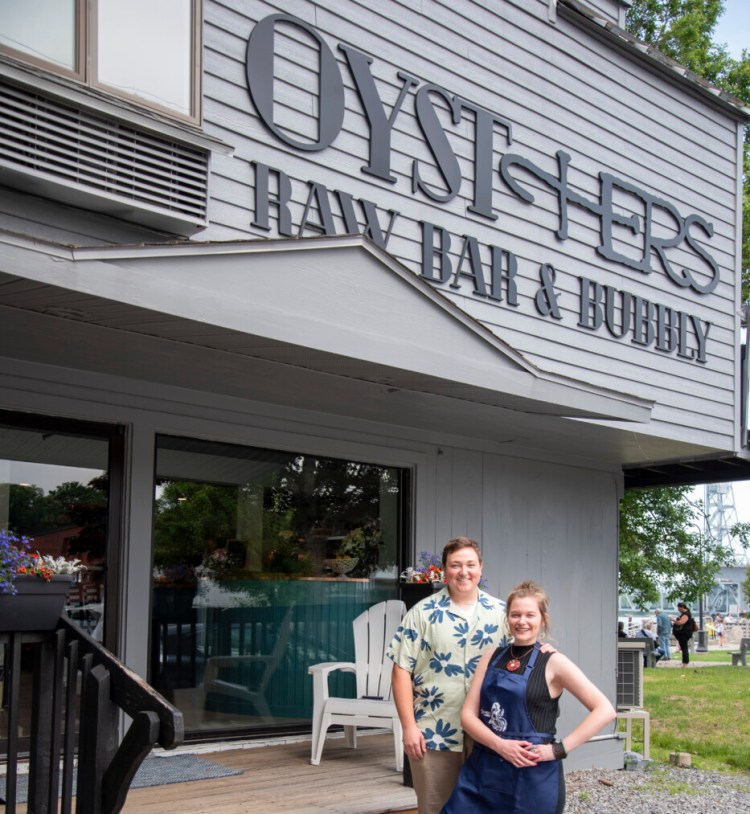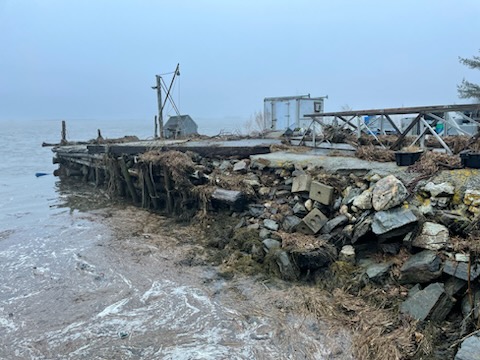
Owners Sadia and Lauren Crosby outside of Oysthers Raw Bar & Bubbly in Bath. Courtesy of Oysthers Raw Bar & Bubbly
Sadia Crosby is still looking for a way to repair the damage done to her family’s wharf months after the devastating January storms.
Crosby owns Oysthers Sea Farm in Georgetown and Oysthers Raw Bar & Bubbly on the Bath riverfront with her sister and business partner, Lauren Crosby.
After the January storms cleared, there was significant damage to Crosby’s wharf, rendering it useless for this season. Her family wharf still stands but suffered serious structural damage. Other damage includes a hydraulic winch that is unusable, along with losses of oyster cages, bags, buoys, crates for oysters and lobsters, baskets to wash the oysters, and anything that wasn’t tied down to the dock when the storm hit.
“I am just one of the many wharfs that were affected down here that are not just residential but commercial use,” Sadia Crosby said.
Crosby applied for FEMA assistance as soon as it became available but was denied because the grant wouldn’t cover damage to structures over the water like wharfs, according to Crosby. The deadline to apply for FEMA aid to cover uninsured losses stemming from the January storms passed Friday.


The extent of the damages to Sadia Crosby’s wharf after the January storms. Courtesy of Sadia Crosby
Crosby also doesn’t qualify for the recent $25 million in funding from the Working Waterfront Resilience Grant Program — from which applicants can request up to $2 million for design, permitting and construction for 50% of total project costs — through the Maine Department of Marine Resources and the Maine Department of Transportation because she doesn’t have 10 or more people working at her wharf.
“I think everybody would love to see every single wharf get some funding, but it’s $25 million and there has to be some stipulations,” said Monique Coombs, director of community programs for Maine Coast Fisherman’s Association. “Everybody is going to do the best they can; it’s a good start, but I think that we got a long road ahead of us.”
The Working Waterfront grant is available to help rebuild wharves and piers that serve at least 10 commercial fishermen or aquaculturists using the wharves to access their vessels for commercial purposes. However, priority is given to repair projects supporting 20 or more commercial fishermen or aquaculturists. Applications for that program will be accepted through June 10.
“We are not big enough to receive this funding, but we are also still part of the working waterfront community,” Crosby said. “We are a small aspect of this bigger problem.”
Crosby has reached out to contractors for an estimate to make repairs to her wharf but is still waiting to hear back. Many contractors are booked out due to high demand. She estimates the cost could be in the $80,000–$120,000 range. Crosby’s flood insurance does not cover her wharf either, which has left a gap in storm damage coverage.
The Island Institute, a nonprofit based in Rockland, did offer small grants of up to $5,000 to be used to replace or fix equipment such as the broken hydraulic winch. However, only a handful of small grants were available and she still wasn’t able to get the funding, Crosby said.
The grants were part of the Business Resilience Storm Response Grants that totaled $250,000 and applied to 52 waterfront businesses, according to a press release by the Island Institute.
FEMA suggested she try to get a loan from the Small Business Association, but Crosby said she doesn’t have room in her finances to take out another loan.
“Unfortunately, I kind of [have] my hands tied right now because I can’t afford to fix [the wharf] but I also need it for my business,” Crosby said.
There are concerns with how the family-owned wharfs will be able to rebuild in regard to funding, permitting, and getting up and running in time for prime lobstering season, Coombs said.
The losses caused by January’s storms weren’t limited to what was over the water. Her business lost power for three or four days, Crosby said. As a result, she lost about $5,000–$6,000 worth of food, oysters and high-end wines. Crosby filed an insurance claim but was denied again because her insurance does not cover food losses.
“I am determined to [get this fixed] because I don’t want to be the generation that succumbs,” Crosby said. “I’ll find a way to fix that wharf, but it’s definitely a big challenge.”
Coombs said it will take years for the community to recover from the storms, which only exacerbated challenges that already existed on the waterfront, including the rising costs of doing business, increasing regulations and gentrification of coastal communities.
Related Stories








:max_bytes(150000):strip_icc()/roundup-writereditor-loved-deals-tout-f5de51f85de145b2b1eb99cdb7b6cb84.jpg)



Invalid username/password.
Please check your email to confirm and complete your registration.
Use the form below to reset your password. When you’ve submitted your account email, we will send an email with a reset code.